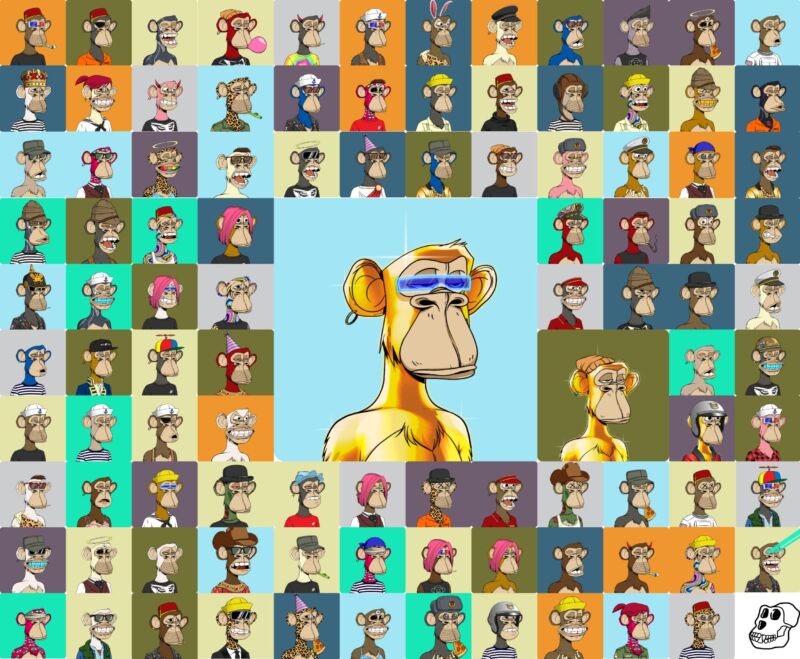
The Sotheby's auction house has been named as a defendant in a lawsuit filed by investors who regret buying Bored Ape Yacht Club NFTs that sold for highly inflated prices during the NFT craze in 2021. A Sotheby's auction duped investors by giving the Bored Ape NFTs "an air of legitimacy... to generate investors' interest and hype around the Bored Ape brand," the class-action lawsuit claims.
The boost to Bored Ape NFT prices provided by the auction "was rooted in deception," said the lawsuit filed in US District Court for the Central District of California. It wasn't revealed at the time of the auction that the buyer was the now-disgraced FTX, the lawsuit said.
"Sotheby's representations that the undisclosed buyer was a 'traditional' collector had misleadingly created the impression that the market for BAYC NFTs had crossed over to a mainstream audience," the lawsuit claimed. Lawsuit plaintiffs say that harmed investors bought the NFTs "with a reasonable expectation of profit from owning them."
Sotheby's sold a lot of 101 Bored Ape NFTs for $24.4 million at its "Ape In!" auction in September 2021, well above the pre-auction estimates of $12 million to $18 million. That's an average price of over $241,000, but Bored Ape NFTs now sell for a floor price of about $50,000 worth of ether cryptocrurrency, according to CoinGecko data accessed today.
Investors previously sued Bored Ape creator Yuga Labs, four company executives, and various celebrity promoters including Paris Hilton, Gwyneth Paltrow, Kevin Hart, Snoop Dogg, Serena Williams, Madonna, Jimmy Fallon, Steph Curry, and Justin Bieber. The original class-action was filed in December 2022, and Sotheby's was added as a defendant in an amended complaint submitted on August 4.
Yuga describes its collection of 10,000 Bored Ape NFTs as "unique digital collectibles living on the Ethereum blockchain" that double as a "Yacht Club membership card." The website has some "members-only" areas. "When you buy a Bored Ape, you're not simply buying an avatar or a provably rare piece of art," the NFT collection's website says. "You are gaining membership access to a club whose benefits and offerings will increase over time. Your Bored Ape can serve as your digital identity, and open digital doors for you."
Lawsuit: Yuga “colluded” with Sotheby’s
The amended lawsuit alleges that "Yuga colluded with fine arts broker, Defendant Sotheby's, to run a deceptive auction." After the sale, a Sotheby's representative described the winning bidder during a Twitter Spaces event as a "traditional" collector, the lawsuit said.
The lawsuit said it turned out the auction buyer was now-bankrupt crypto exchange FTX, whose founder Sam Bankman-Fried is in jail awaiting trial on criminal charges. Ethereum blockchain transaction data shows that after the auction, "Sotheby's transferred the lot of BAYC NFTs to wallet address 0xf8e0C93Fd48B4C34A4194d3AF436b13032E641F3,77 which, upon information and belief, is owned/controlled by FTX," the complaint said. Speculation that FTX was the buyer had been percolating since at least January 2023.
The lawsuit alleges that Yuga Labs and Sotheby's violated the California Unfair Competition Law, the California Corporate Securities Law, the US Securities Exchange Act, and the California Corporations Code. The plaintiffs also claim that Sotheby's Metaverse, an NFT trading platform opened after the auction, "operated (or attempted to operate) as an unregistered broker of securities."
"FTX has several deep ties to Yuga such that it would be mutually beneficial for both Yuga and FTX (as well as Sotheby's) if the BAYC NFT collection were to rise in price and trading volume activity. Upon information and belief, given the extensive financial interests shared by Yuga, Sotheby's and FTX, each knew that FTX was the real buyer of the lot of BAYC NFTs at the Sotheby's auction at the time that Sotheby's representatives were publicly representing that a 'traditional' buyer had made the purchase," the lawsuit said. FTX is not named as a defendant.
Ape prices soared, then plummeted
After the auction, the price of Bored Ape digital assets hit a new high and kept rising for months. It peaked at over $420,000 in April 2022 but plummeted to about $90,000 six weeks later, according to CoinGecko.
The class action lawsuit's named plaintiffs are Johnny Johnson, Ezra Boekweg, Mario Palombini, and Adam Titcher. They are trying to get certification of a class consisting of "all investors who purchased Yuga's non-fungible tokens ('NFTs') or ApeCoin tokens ('ApeCoin') between April 23, 2021 and the present." There were over 103,000 account holders of Yuga securities as of December 1, 2022, the lawsuit said.
"While the Executive Defendants made hundreds of millions of dollars, investors were left with NFTs worth a fraction of their artificially inflated value," the original version of the complaint in December said.
Yuga and other defendants have a September 12 deadline to file motions to dismiss the complaint. Sotheby's told CNN this week that the "allegations in this suit are baseless, and Sotheby's is prepared to vigorously defend itself." Yuga Labs similarly called the allegations "completely without merit or factual basis."
reader comments
410